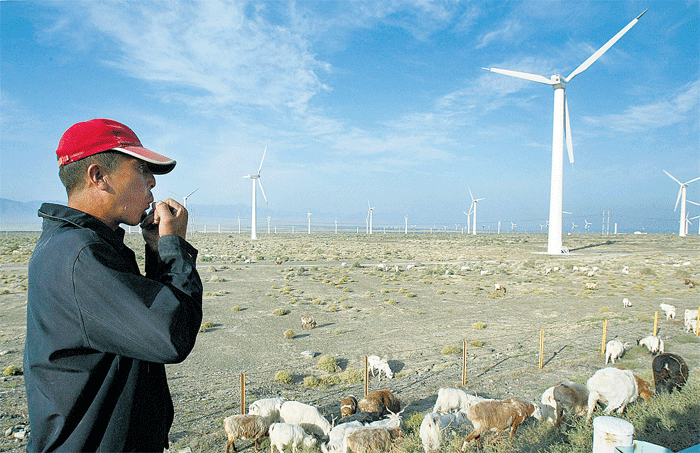China's renewed effort to clean up its act
China’s environmental reputation is not among the best in the world, but it is taking steps to improve with a number of green and energy commitments

When it comes to environmental issues, China tends to generate negative headlines – its badly polluted skies, its dirty rivers, and its melting glaciers are all images we associate with China’s remarkable economic rise. What is less well known is that China is leading the world in adopting key green technologies to help to fuel the country’s economic boom. The central government in Beijing has set a target of generating 15 per cent of all electricity from renewable sources by 2020, and the effects of China going green will be felt all around the world.
There is a lot to do. China assumed the mantle of the world’s largest carbon emitter from the United States in 2007, and its people are forced to live with the consequences of rapid industrialisation, mostly driven by burning fossil fuels. Coal provides nearly 70 per cent of China’s energy needs, and this is not likely to end any time soon, but what is crucial is the mix of how China supplies its energy.
According to REN21’s 2010 Renewables Global Status Report, China added 37GW of renewable power capacity, more than any other country, to reach 226GW of total renewables capacity. Globally, nearly 80GW of renewable capacity was added, including 31GW of hydropower and 48GW of non-hydro capacity. China was the top market for windpower, doubling its windpower capacity for the fifth year in a row. China added 13.8GW of windpower, representing more than one-third of the world market – up from just a 2 per cent market share in 2004. China has nearly doubled its hydropower capacity during the five years to 2009, adding 23GW in 2009 to end the year with 197GW. Moreover, more than 70 per cent of the world’s solar hot-water heaters are in China, and they are the main source of hot water for many households.
In July, China’s National Development and Reform Commission announced an alternative energy planning programme which would invest 5,000 billion yuan (£470bn) between 2011 and 2020, creating 15 million jobs in the sector. The plan was announced by Jiang Bing, the head of the National Energy Administration, who said the bureau envisages that, by 2015, natural gas would account for 8.3 per cent of energy, with hydropower and nuclear power jumping from 7 per cent to 9 per cent of primary energy consumption. Windpower, solar power and biomass would increase from less than 1 per cent now to almost 2.6 per cent of the total.
There are other groundbreaking projects taking place. China installed the first major offshore wind project outside of Europe last year, adding 63MW by year-end for a project that reached 102MW earlier this year. Shi Pengfei of the China Hydropower Engineering consulting group believes China has the best and the newest wind turbines. “By the end of 2009, China’s total capacity of windpower operations increased by 92.26 per cent compared with the same period of 2008,” Shi said.
Although China adopted some muscular negotiating tactics at the Copenhagen summit on climate change, and some countries accuse Beijing of hijacking the talks, the smart money is on China’s efforts to boost green technology and clean energy options. China has pledged to cut the intensity of carbon emissions per unit of its gross domestic product (GDP) in 2020 by 40 to 45 per cent against 2005 levels. While this will not cut the overall amount of emissions, it is a step in the right direction. “Post-Copenhagen, China needs to continue its domestic efforts to improve green tech and sustainability, and I’m confident it will. China should also see a strong demand for it to play a leadership role internationally,” said Yang Ailun, the head of Climate and Energy at Greenpeace China. “China is committed to developing clean energy because of all the domestic imperatives to do so. It’s good for energy security and it’s good for economic development. Announcing a target was an effort to be seen as willing to do its fair share,” Yang said.
The Chinese government is investing serious resources to stop pollution, and binding reduction targets have been included in the central government’s 11th Five-Year Plan to control the discharges of key water pollutants, such as chemical oxygen demand (COD) and sulphur dioxide. China’s Vice-Minister of Environmental Protection, Li Ganjie, said in December if it achieves a reduction in these pollutants, this would result in a reduction of 250 million tons in CO2 emissions. Yang believes the main potential in clean energy lies in energy efficiency and clean energy technology. “One area of particular interest is how to make more efficient cars – China is already a world leader in electric cars. Other areas include wind energy, and solar energy, where China is already a top-three manufacturer. The solar market is mainly manufacturing for export but growth is slowing, so it’s now crucial for the government to give support for the domestic market,” he said.
Huang Min, the founder of the Himin Solar Energy Group in Dezhou, is on a quest to convince his fellow Chinese of the need to go green. “China has already made a promise on emissions reduction. It shows China can behave like a big country and it shows the Chinese government is committed. This promise is not only a challenge, but a huge business opportunity. This pledge lifts China on to the global political and economic stage,” said Huang. When it comes to issues of sustainability, China is too big to be ignored. m
Join the debate on the future of energy usage and tell us what you think
Join our commenting forum
Join thought-provoking conversations, follow other Independent readers and see their replies
Comments
Bookmark popover
Removed from bookmarks